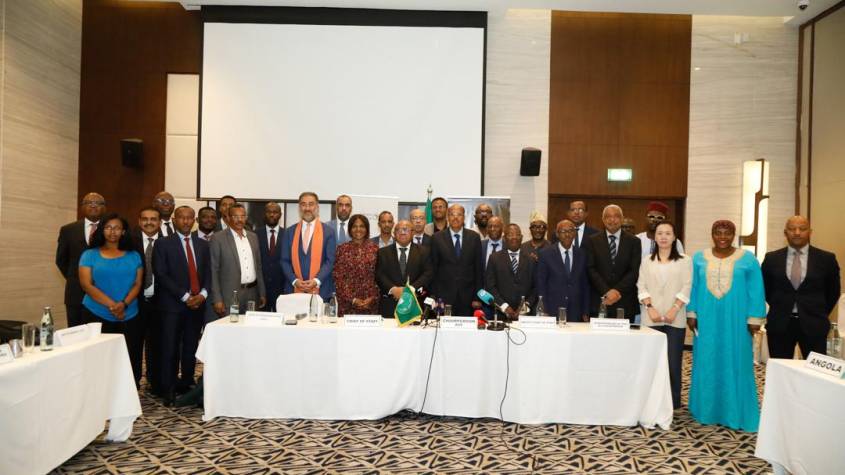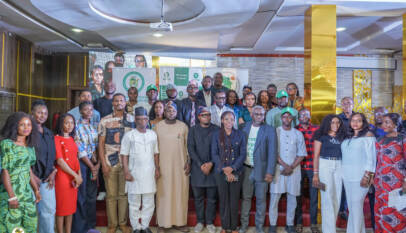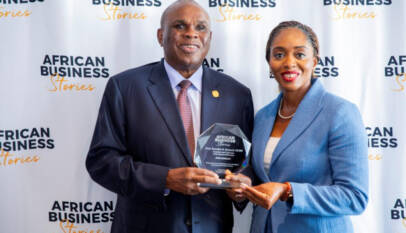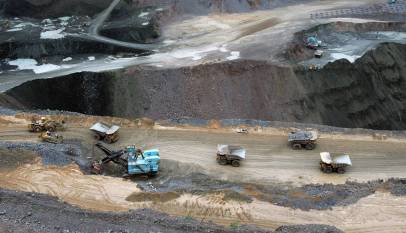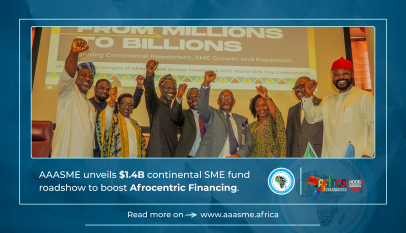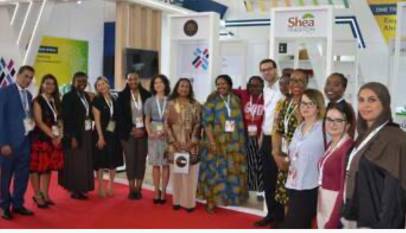Day Youssouf Unveiled Roadmap for African Union in Maiden Media Parley
A week ago, the new Chairperson of the African Union Commission (AUC), Mahamoud Ali Youssouf, held his first official press briefing at the AU Headquarters in Addis Ababa, Ethiopia, where he unveiled his Commission’s roadmap, pledging to prioritize engagement with the African media.
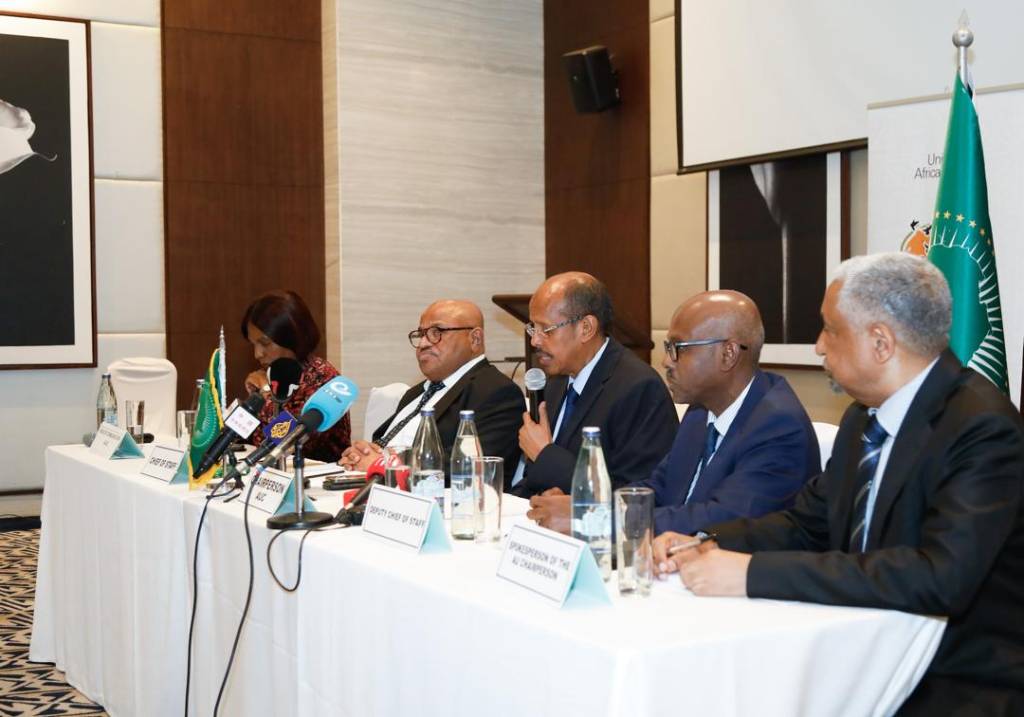
Following his February election as Chairperson of the African Union Commission (AUC) at the 38th Ordinary Session of the Assembly of Heads of State and Government of the African Union (AU) in Addis Ababa, Ethiopia, Mahamoud Ali Youssouf, took over the mantle of the Commission’s leadership from Moussa Faki Mahamat of Chad in March.
The seasoned diplomat was elected on February 15, 2025, after securing the required two-thirds majority votes from 49 eligible AU Member States. Now tasked with steering Africa’s continental body, Youssouf has pledged to leverage his experience as Djibouti’s top diplomat for 20 years to advance Africa’s inclusive growth, peace, and self-reliance in a shifting global order.
A week ago, Youssouf held his first official press briefing at the AU Headquarters in Addis Ababa, where he unveiled his new Commission’s strategic priorities and institutional goals for the next four years. The high-level briefing offered the new AUC helmsman the opportunity to comprehensively outline his vision for the continent and engage with the African media fraternity.
While addressing the press, Chairperson Youssouf emphasized the centrality of peace, the AU’s financial sovereignty, digital transformation, and inclusive governance in repositioning the Union and implementing Agenda 2063, as well as positioning Africa as a stronger and more unified voice in global affairs.
On Peace and Security
Youssouf underscored the strengthening of conflict prevention mechanisms, the operationalization of the African Standby Force (ASF), and enhanced early warning systems as panacea against terrorism and unconstitutional changes of government. The AUC helmsman acknowledged the growing stability in Somalia and the political transition in Gabon, noting the AU’s active role in supporting stabilization and democratic transitions in its Member States.
It would be recalled that Youssouf had, upon assuming office, paid a visit to Somalia where he highlighted critical funding shortfalls for the African Union Support and Stabilisation Mission in Somalia (AUSSOM), calling for renewed commitment to the country’s peace and stabilization efforts.
Regarding Sudan, Youssouf reiterated the AU’s neutrality and vehement rejection of externally imposed solutions. “We do not, we will not support any parallel government to be created anywhere. We will not support any intervention, interference of any kind in the crisis in the Sudan. The resolution of the Sudanese crisis should be done through a process led by the Sudanese themselves,” he stressed.
On Financial Sovereignty
The AU has, since its inception, been bogged down by overreliance on external funding, which arguably impacts its sovereignty and ability to set its priorities and implement its development agenda, including peace operations. In 2016, the AU Assembly adopted a historic decision directing all Member States to implement a 0.2% levy on eligible imports into the continent to finance the AU. Almost a decade later, the majority of the 55 Member States are not collecting this levy.
Thus, a significant portion of Youssouf’s address at the briefing revolved around the AU’s financial sovereignty, particularly mobilizing domestic financial resources and reducing reliance on external donors. He described financial autonomy as a precondition for genuine continental sovereignty.
“Our orientation when it comes to mobilizing financial resources for our organization is first and foremost to rely on our domestic resources and then continue to engage new partners. I have already written a letter to the Ministers for Finance of our Member States emphasizing the idea of relying on our resources. First and foremost, this is our new approach,” Youssouf stated.
In this vein, Chairperson Youssouf also unveiled a series of innovative and homegrown financial instruments to reduce the AU’s external dependence and allow it to fund its development priorities. These include an African Diaspora Bonds to tap into over $95 billion in annual remittances; a continental e-commerce levy to harness the growing digital economy; and an AU Sovereign Wealth Fund to ensure long-term macroeconomic stability.
“With regard to our financial future, we have to innovate and rely on our capacity. That is why we are launching African Diaspora Bonds, endorsed by the AU, to tap into the $95 billion remitted annually by our brothers and sisters abroad. We are also working on a continental e-commerce levy to better harness our digital economy, and establishing an AU Sovereign Wealth Fund to secure our long-term macroeconomic stability,” he said.
On G20, EU, and Arab League
Youssouf said the AU is readying for robust dialogue with major international partners to strengthen its global ties and drive Africa’s development. At the top of Youssouf’s list are the European Union (EU), China through the Forum on China-Africa Cooperation (FOCAC), Japan via the Tokyo International Conference on African Development (TICAD), and the Arab League.
The Chairperson describes Africa’s membership in the G20 as an opportunity to press for fairer global financial rules and advocate for major infrastructure investments that directly benefit Africa. “The AU is now an active participant in the G20. We are advocating for reforms in the global financial architecture, pushing for more infrastructure investment, and ensuring that Africa’s trade and development priorities are not sidelined in international discussions,” he said.
While highlighting the importance of external partnerships, Youssouf said the AU is working to ensure previous commitments, particularly those made at the 6th EU-AU Summit in 2022, are fully implemented. “Have the pledges and promises that were made been implemented? We have the Africa-Europe Investment Package worth €150 billion that will support our common ambition for 2030 and Agenda 2063, but we’re still waiting for those investments.”
Thus, the Commission Chairperson called for a renewed commitment to making the AU-EU partnership work through increased investment in infrastructure and enhancing trade ties with the EU, but also with the Arab League. “In a few days, I will attend the Arab League summit in Baghdad to see how best we can create the new partnership between the two groupings.”
On AI, Digital Transformation, and Energy
Youssouf said digital transformation and AI features prominently in his Commission’s agenda, describing universal internet connectivity and the expansion of fiber-optic infrastructure as essential prerequisites for Africa’s effective participation in the digital economy. “The continent has a problem of connectivity, achieving both cheap and wide access to broadband internet is something that we, at the AU Commission, are focusing on. We have a strategy for that.”
He pointed to platforms like the April 2025 Global AI Summit on Africa in Kigali, Rwanda, as a platform to drive coordinated AI policymaking among AU Member States, underscoring the importance of linking power grids with digital infrastructure. “The idea is to have a coherent AI policy but also create more synergy among Member States. We need a fiber optic grid connecting Member States. So, the idea is really to increase the grid in power but also fiber optic connectivity.”
Youssouf said energy access is non-negotiable for real development, describing the January 2025 Mission 300 Africa Energy Summit held in Dar es Salaam, Tanzania, as a right step in the right direction. “The whole idea is to make electricity available to 300,000,000 Africans. Without electricity, it’s very difficult to contemplate even the idea of having access to the internet and then even going beyond with AI.”
On Youth, Women’s Empowerment
Youssouf described youth empowerment and innovation as central to the continent’s transformation agenda and pledged to accelerate the implementation of the Africa Continental Free Trade Area (AfCFTA) Agreement by addressing logistical bottlenecks and dismantling non-tariff barriers. The AfCFTA is expected to increase intra-African trade by more than 50% by 2030, creating millions of jobs and boosting livelihoods across the continent.
In this vein, the Chairperson recalled that the AU has recently adopted its Start Up Model Law “to help African youngsters to create their start-ups and also boost the entrepreneurship processes on the continent.”
He reaffirmed the new Commission’s commitment to building an AU that reflects the voices and priorities of its people, particularly women and youth, hence the appointment of a new Special Envoy for Women. “We need an African Union of the People. And media visibility will be one of the priorities for this new commission. That is why I appointed a special envoy for women, former Tanzanian foreign minister Liberata Mulamula,” Youssouf said.
On Sustaining Media Engagement
Chairperson Youssouf concluded his briefing with a promise of sustained media engagement as a means of reinforcing the Commission’s commitment to transparency and accountability to African citizens. Going forward, the Chairperson pledged to conduct quarterly press briefings and grant monthly interviews to media organizations to ensure consistent communication and counter disinformation about the AU’s operations around Africa.
“Every three months, we’ll have a media breakfast conference. And also, we will have one interview every month. There will be regular statements and communiqués. This is to foster the tradition of having regular encounters with the media. Because when information is not provided, disinformation takes precedence,” Youssouf assured.
Previous leaderships of the AU Commission could not rank high in engagement with the African media fraternity. The effectiveness of AU’s overall engagement with the mainstream media is a complex issue with both successes and challenges. Weak media engagement leaves African citizens unaware of key Agenda 2063 projects and initiatives like the AfCFTA. Insider sources reveal many AU organs do not even have dedicated budget lines for communication, and those that do always complain of being allocated a pittance!
Chairperson Youssouf’s decision may prove to be a game-changer in AU-media relations. If he succeeds, he will also be living up to his pledge of delivering an AU of the People since the media serves as a vital link between the AU and its over 1.2 billion citizens. And like he aptly said, the information gap only leads to disinformation! Only time will tell whether or not the new helmsman in Addis Ababa may become a pace-setter: live up to this significant promise.

